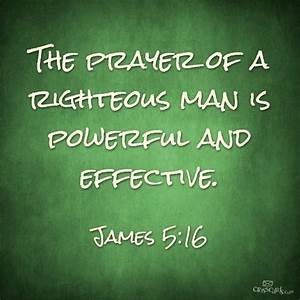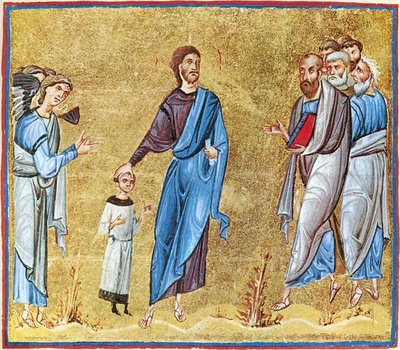“Prayer: Powerful and Effective”

James 5:13-20 (5:16) – September 30, 2018
If anyone has been following the news in the past weeks out of Washington, you know that journalists have been trying hard to get as much information as possible about the people and the situations involved. Journalists always are on the lookout for reliable information. They want to answer some basic questions: Who, What, When, Where, and Why. If you can answer those five questions clearly, you will have a good, solid news story.
The past two weeks have been a roller coaster for many people. With the nail-biting news about the Supreme Court nomination, many people across the United States have been sitting on the edge of their seats. While I am not going to play politics or tell anyone which Washington politician or opinion is right or wrong, as a pastoral caregiver I do pay close attention to people’s emotions and reactions.
What I have seen in these past days are the overwhelming number of people with heightened emotions and reactions to anxious, even fearful situations. As someone involved in pastoral care and trained as a chaplain, I notice these things. In our scripture reading today, we find the apostle James talking straight about how to pray, and thus deal with things similar to these: heightened emotions and reactions to anxious situations.
The apostle James was a practical kind of guy. We can see that from this short letter, the only letter he wrote, included in the New Testament. He gives some practical advice to his readers on how to live a faithful and effective Christian life: how to live faithfully with others in society, how to control the tongue, how to turn away from evil and towards God. Here, in the fifth chapter of James, he turns to prayer. As we look at this passage, James tells his friends how to pray, in very practical terms, almost the same way as a news reporter might tell it.
Here are the first verses of our scripture reading, from one of my favorite modern translations of the Bible, The Message, by Eugene Peterson. “Are you hurting? Pray. Do you feel great? Sing. Are you sick? Call the church leaders together to pray and anoint you with oil in the name of the Master. Believing-prayer will heal you, and Jesus will put you on your feet. And if you’ve sinned, you’ll be forgiven—healed inside and out.”
James covers the bases here. People who are hurting, happy, sick, sinning. In other words, he tells us Who ought to pray. Anyone ought to! Anyone who needs God’s help or anyone who has received God’s blessing ought to pray. That means anyone—all of us.
What is the next question? What should we pray about? Anything, and everything. That is the wonder and power of prayer. So many things to pray about, but James gives some great descriptions. He tells us what kinds of situations, in just a few words.
When should we pray? Anytime is a great time to pray. When we are hurting, or feeling great, or sick, or sinning? In each case, we are invited by James to bring everything to the Lord in prayer. Whenever we are in trouble, or in need to healing, or for forgiveness from sin? That is the time for prayer. Anytime.
Where are we to pray? Absolutely anywhere. This is one that James does not directly address, but we can see James tells us we are able to pray any time we need help from God. So, it just makes sense that you and I can pray anywhere we happen to be. Wherever we are, God is with us. God is everywhere.
The last question is, Why should we pray? The simple answer? Because God answers prayer. Verse 16 tells us “Therefore confess your sins to each other and pray for each other so that you may be healed. The prayer of a righteous person is powerful and effective.”
Did everyone hear? “The prayer of a righteous person is powerful and effective.”
Except, I have been hearing from a large number of people during the past two weeks. Such difficult and traumatic events are extremely hurtful, especially for people who have had similar things happen to them. Psychologically speaking, the mention of a similar traumatic event can very well cause someone else to vividly relive their personal experience, no matter how long ago it happened. Trauma is imprinted on the brain in a unique way. It’s like the brain flags the specific memories as super-important. Those flagged memories can surface or re-surface at unpredictable times, when someone reminds you of something traumatic that happened. Like, for example, this serious discussion in the news of harassment and assault.
During the past two weeks, calls to rape and sexual abuse help lines have skyrocketed, anywhere from doubling to running four times as many as in a similar time period. Online, in social media, and personally, I have heard more people tell of harrowing incidents of rape and sexual abuse, and the horrible responses received when these actions were reported. Plus, I have both read and heard of situations where no one ever reported these horrific acts—until now.
Though I don’t who or what you believe, I think all of us can agree that as God’s people, we all need regular repentance and soul-searching, no matter what. We are also all in need of healing, personally, and certainly communally. Isn’t that what James tells us here?
When I was a chaplain, working in critical care units like the Emergency Department, Intensive Care, and trauma support all over the hospital, my primary job would be that of compassionate listener—even before prayer, and also as a heartfelt part of prayer. I suggest for all of us to consider a heart of compassion and a gentle hand of mercy. It’s time to put our defenses down and instead experience the vulnerability of listening to one another.
“If someone has a story to tell, the greatest gift you can offer is simply to listen. You don’t need to have answers or wisdom. You probably don’t need to say anything except, ‘I hear you. I believe you. I’m sorry you experienced that.’ In the compassionate version of the world I yearn for, we offer one another solidarity, a listening ear, and a tender heart. “ [1]
As this letter tells us, the apostle James was practical. He also had quite the reputation for prayer. We all know the familiar saying “Listen to what I do, not what I say.” That was James. He would not tell his friends and followers to pray if he didn’t follow Jesus in prayer himself.
“Through the power of prayer, total personal and communal healing can occur. James was following the example of Jesus who taught his disciples to pray and showed them that people can be healed through prayer.” [2] James spent so much time in prayer that he had the nickname “Old Camel Knees,” since his knees were so hard and callused from staying on them in prayer for hours on end.
As one commentator said, “we must be active participants in the process. Whether it is the healing touch of the laying on of hands or a simple hug from a sister or brother in Christ or the potent power of prayer or the relief of corporate confession, active participation in the Body of Christ is preventative medicine at its best.” [3]
What are we waiting for? “Take it to the Lord in prayer.”
Amen. Alleluia.
(My sincere thanks to Charles Kirkpatrick, for his Object Lessons & Children’s Sermons, Coloring Pages, Puzzles. Sermons4Kids.com. https://www.sermons4kids.com/5Ws_of_prayer.htm I borrowed freely from this children’s activity for this sermon.)
(What follows is the Response our church had after the sermon. Instead of a Prayer of Hymn of Response, we had the following activity.)
Amidst the prescriptions James prescribes, the anointing of the sick is one that we do not do enough of, and one I want to offer to this congregation, to this family of faith during the worship service.
We read again these verses from our scripture passage from James chapter 5: “Call the church leaders together to pray and anoint you with oil in the name of the Master. Believing-prayer will heal you, and Jesus will put you on your feet. And if you’ve sinned, you’ll be forgiven—healed inside and out.”
Come, let us worship God, and claim our desire to be made whole – spiritually, emotionally, and physically.
And if anyone is just sick and tired of the current state of the world, come and be prayed over and be anointed with oil, a sign of the possibility of healing, inside and out.
In the name of our Savior Jesus Christ, be strengthened and made whole, filled with God’s grace; may you know the healing power of the Holy Spirit. Amen.
Dear Comforting God, thank You for hearing and answering our prayers. Help us to remember that You want to heal us when we are sick, help us when we are in trouble, forgive us when we sin, and rejoice with us when we are happy. In the healing name of Jesus, Amen.
[1] https://fosteringyourfaith.com/2018/09/30/time-for-compassion/
Rev. Dr. Susan J. Foster (Sue) is the pastor of the East Woodstock Congregational (UCC) Church in CT.
[2] http://www.theafricanamericanlectionary.org/PopupLectionaryReading.asp?LRID=52
Commentary, James 5:13-16, Christopher Michael Jones, The African American Lectionary, 2008.
[3] http://www.stewardshipoflife.org/2012/09/rx-for-broken-lives-and-faltering-faith/
“Rx for Broken Lives and Faltering Faith,” Sharron R Blezard, Stewardship of Life, 2012.
(Suggestion: visit me at my regular blog for 2018: matterofprayer: A Year of Everyday Prayers. #PursuePEACE – and my other blog, A Year of Being Kind . Thanks!




